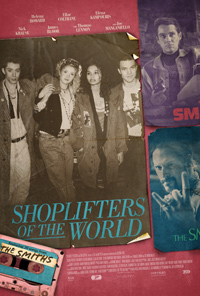In the Mood for Morrissey: Kijak Languishes in Eighties Angst
 Documentarian Stephen Kijak returns to narrative filmmaking for the first time since his 1996 debut Never Met Picasso with 1980s period piece Shoplifters of the World. At first glance, the title doesn’t provide any clues to the film’s intentions (something like Things to Do in Denver When Your Favorite Band is Dead, maybe?), but the specific time and place of this 1987 Colorado set tale will likely appeal to audiences holding the same sentiments as its main characters, a reverence for The Smiths.
Documentarian Stephen Kijak returns to narrative filmmaking for the first time since his 1996 debut Never Met Picasso with 1980s period piece Shoplifters of the World. At first glance, the title doesn’t provide any clues to the film’s intentions (something like Things to Do in Denver When Your Favorite Band is Dead, maybe?), but the specific time and place of this 1987 Colorado set tale will likely appeal to audiences holding the same sentiments as its main characters, a reverence for The Smiths.
The short-lived British indie band lasted five years and released four studio albums, defining an entire generation of angst-ridden teenagers drifting into a melancholically inclined adulthood. Kijak revisits the hijacking of a Denver radio station by an overzealous Smiths fan, upset at their dissolution, forcing the DJ to play the band’s catalogue over the course of one evening.
The worst of all possible things happen just as Chloe (Helena Howard) is on the verge of saying goodbye to her trio of best friends after graduating high school—her favorite band, The Smiths, have called it quits. Reeling in the aftermath of this drama, she embarks on a strenuous night out with Billy (Nick Krause), a pseudo love-interest who has just enlisted at the behest of his father, but seems more interested in exploring his sexuality. They are joined by Sheila (Elena Kampouris) and her long-term beau Patrick (James Bloor), the latter also seemingly on the verge of recognizing desires he’s long kept at bay. As they toggle around Denver, from parties to bars, they become enthralled to discover Dean (Ellar Coltrane), a young man who Chloe flirts with from the local record store, has hijacked a heavy metal radio station forcing DJ Full Metal Mickey (Joe Manganiello) to play The Smiths on repeat. As the night unfolds, each of them realizes they must also let go of something they’ve held dear for far too long, just like The Smiths.
If you’re a fan of The Smiths or their handsome, infamously morose front man Morrissey, who went on with his own solo career, then Shoplifters of the World will likely appeal to the glory days of this period-defining group. Perceptions of gender norms and fluid sexuality encompassed in their following, Kijak rightly hits on the pulsing energy of why The Smiths were so important, particularly to outsiders and pariahs who refused to accept preordained rules of the heteronormative culture. Reagan’s American was besotted by the AIDs crisis, refusing even to publicly acknowledge the pandemic, and for LGBTQ youths growing up in an era which no such acronym existed, the anguish of The Smiths served as a reprieve. Since Kijak’s film is an ensemble, which plays with more realistic sentiments of budding sexuality than, say, John Hughes titles made during this period, queer elements are merely part of the tapestry, and sometimes as superficially attenuated as the more familiar through line of Cleo and Dean.
What’s perhaps most entertaining in Shoplifters of the World are all the peripheral references, which, while dripping with nostalgia, are a reminder of all the exciting remnants from the period, (from Betty Blue and Liquid Sky to Bauhaus and Jack Kerouac), and a time when teens were part of broader cultural moments, like foreign film and Beat generation trailblazers (who provided the template for The Smiths).
Try as they might, Ellar Coltrane (of Linklater’s Boyhood, 2014, whose Morrissey styled do has him looking like a cross between Jonathan Rhys Meyers and Chris Isaak) and Joe Manganiello can’t navigate the forced respect and admiration the script lays on their bonding scenario. Helena Howard manages to be the perfect breath of freshness here, whose zeal for her favorite band is so cheesy it feels realistic (“I’m so tired of myself tonight,” she comments). A sequence where Cleo seductively demeans a group of jocks over their musical tastes at a party recalls the shlock of Linda Blair flipping off the predatorial gang in Savage Streets (1984), for instance. The only trouble if, for those who do not worship at the feet of The Smiths, the vintage soundtrack tends to outwear its welcome, so a third act trip to a gay bar allows for a blast of Bronski Beat for your nerves.
★★½/☆☆☆☆☆


